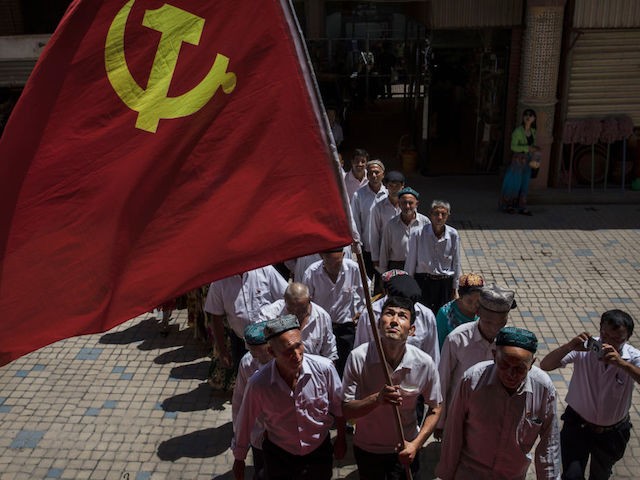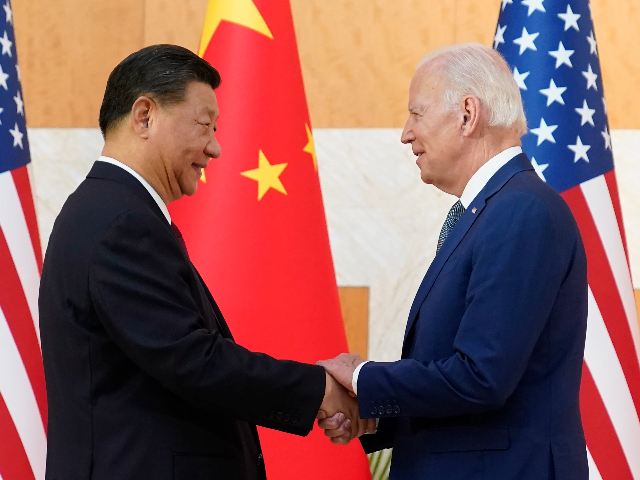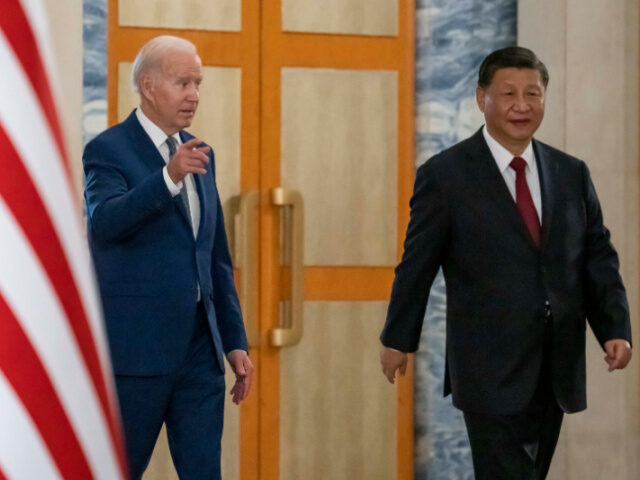Lawmakers, human rights experts, and civil society advocates published statements this week in anticipation of the arrival of genocidal Chinese dictator Xi Jinping to California next week, urging leftist President Joe Biden to raise the issue of Beijing’s deplorable human rights record during an expected meeting between the two.
The Chinese Foreign Ministry confirmed on Friday that Xi would be traveling to San Francisco next week for the scheduled Asia-Pacific Economic Cooperation (APEC) Economic Leaders’ Summit. There, the dictator “will have in-depth communication on issues of strategic, overarching and fundamental importance in shaping China-U.S. relations and major issues concerning world peace and development” with Biden, the Ministry claimed. White House press secretary Karine Jean-Pierre similarly predicted Biden and Xi would “discuss issues in the U.S.-[People’s Republic of China] bilateral relationship, the continued importance of maintaining open lines of communication, and a range of regional and global issues.”
Some reports have indicated, citing anonymous American sources, that Biden and Xi will meet on Wednesday, November 15.
In anticipation of Xi’s visit, a group of 59 human rights organizations published a letter on Wednesday urging Biden to “demonstrate that human rights are a priority in the bilateral relationship by telling Xi that the US will pursue investigations into crimes against humanity and genocide in China” and issue statements against communist human rights abuses. It suggested Biden tell Xi the White House would “continue to address the ongoing crimes against humanity in the Uyghur region until the Chinese government ceases its rights violations.”
“Xi Jinping and his government are assaulting human rights on a scale unprecedented in decades,” the letter read in part. “President Biden, you have a unique opportunity to send strong messages to Xi Jinping about your position on human rights, which will likely have an impact in halting – and possibly reversing – this crisis.”
The dozens of organizations signing the letter included some of the largest groups advocating on behalf of the persecuted Uyghur people of occupied East Turkistan, including the World Uyghur Congress and Campaign for Uyghurs. Other signatories included Christian organizations, such as China Aid and the Christian Coalition 4 Uyghur Freedom, and groups tied to Tibetan organizations and the Falun Gong, which the Communist Party has similarly oppressed.

Ethnic Uyghur members of the Communist Party of China carry a flag as they take part in an organized tour on June 30, 2017, in the old town of Kashgar, in the far western Xinjiang province, China (Kevin Frayer/Getty Images).
The East Turkistan Government-in-Exile, which represents the Uyghur region that Mao Zedong colonized following World War II, is holding its general assembly beginning on Friday and directing its efforts to encourage Biden to “address the Uyghur genocide,” it said in a statement.
“The Uyghurs’ fight for their independence is posed as a permanent solution to end the Chinese occupation and colonization of East Turkistan – the root of the ongoing genocide against Uyghurs and other Turkic peoples,” the group asserted:
🗞️MEDIA ADVISORY – #Uyghur Leaders and Activists Strengthen Call for #EastTurkistan Independence at 9th General Assembly. Activists call on @POTUS @JoeBiden to condemn China's ongoing #UyghurGenocide during upcoming meeting with #XiJinping at #APECSummit.
🗓️ Friday – November… pic.twitter.com/xkpbFpHOl1
— East Turkistan Government in Exile (ETGE) (@ETExileGov) November 7, 2023
📢 Join us on #November12 to commemorate the #EastTurkistan Republic's #IndependenceDay and call on the int'l community to recognize and support East Turkistan's fight to restore its independence to end China's #UyghurGenocide.
📍@WhiteHouse / Lafayette Park
🗓️Nov. 12
🕑 2-4PM pic.twitter.com/7ABm8c6Os7
— East Turkistan National Movement (@ETNational) November 7, 2023
In Congress, the chairmen of the Congressional-Executive Commission on China (CECC) published a letter on Thursday asking Biden to give Xi a list of certified political prisoners held hostage in Chinese prisons and urge him to free time.
“Too often we hear that jailers taunt political prisoners by telling them that the world has forgotten them. We can never allow their words to be true,” the letter read in part. The list of political prisoners includes Uyghur activists, human rights attorneys, and several Americans, most prominently imprisoned Pastor David Lin.
The non-governmental organization Human Rights Watch also issued a demand on Thursday that Biden “confront him [Xi] about his government’s intensifying assault on human rights.”
“The Chinese government is not going to change its conduct unless it faces sustained public pressure about its horrendous crimes in Xinjiang and Tibet, intensifying repression across China, and the dismantling of democracy in Hong Kong,” Elaine Pearson, Asia director at Human Rights Watch, said in a statement. “Government leaders at APEC need to press President Xi both about domestic rights violations and China’s efforts to undermine global human rights norms.”
American corporate media experts have framed the upcoming meeting, the first in-person between the two leftist leaders since their exchange in Indonesia in 2022, as pivotal for improving communication and trade ties between Washington and Beijing.

U.S. President Joe Biden, right, and Chinese President Xi Jinping shake hands before their meeting on the sidelines of the G20 summit meeting, Nov. 14, 2022, in Nusa Dua, in Bali, Indonesia (AP Photo/Alex Brandon, File).
“A broad spectrum of global stakeholders, including countries big and small, investors, and corporations, are eager to see these major powers explore opportunities for cooperation in addressing a range of global issues,” a commentary published by CNBC on Friday asserted, “such as nuclear arms control, climate change, and the regulation of artificial intelligence.”
Human rights are expected to be a low priority in the conversation if mentioned at all. The Biden administration’s foreign policy towards China has significantly deemphasized advocacy for the Communist Party to respect the rights of its citizens, opting instead to elevate issues such as mutual cooperation on the so-called “climate crisis.” During a CNN town hall in February 2021, one of his first public engagements after being inaugurated president, Biden issued a dismissive answer when asked about China’s genocide of Uyghur and other indigenous populations in occupied East Turkistan, justifying the mass killings, forced sterilizations, and imprisonment in concentration camps as necessary, in Xi’s mind, for a “united, tightly controlled China.”
“Culturally, there are different norms that each country and they — their leaders — are expected to follow,” Biden continued, suggesting he would raise human rights issues with Xi only because “no American president can be sustained as president he if doesn’t reflect the values of the United States.”
Xi’s government was found guilty, “beyond a reasonable doubt,” of genocide against Uyghurs, Kazakh, Kyrgyz, and other peoples of East Turkistan during an investigation by an independent tribunal in 2021 that compiled eyewitness testimony, government documents, and other evidence against Beijing. The 2022 Xinjiang Police Files, a massive publication of Chinese government documents by researcher Adrian Zenz and the Victims of Communism Memorial Foundation, revealed Communist Party officials frequently crediting Xi personally with the idea of exterminating the Uyghur people by “break[ing] lineages,” enslaving people, sterilizing them, and placing them in concentration camps.
China has implemented similar measures against ethnic Tibetans and Mongolians. It also systematically persecutes Christians, members of the Falun Gong spiritual movement, human rights advocates generally, and anyone perceived to disagree with Xi Jinping’s indefinite rule over the country.

COMMENTS
Please let us know if you're having issues with commenting.